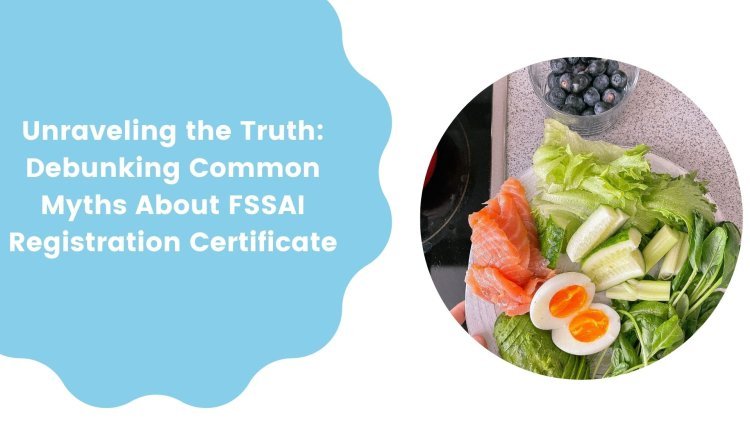Unraveling the Truth: Debunking Common Myths About FSSAI Registration Certificate
FSSAI Registration Certificate is crucial for fostering awareness and promoting compliance within the food industry.

In the bustling world of food business, where regulations and certifications are paramount, the FSSAI (Food Safety and Standards Authority of India) Registration Certificate stands as a cornerstone of credibility and trust. Yet, despite its significance, numerous myths and misconceptions swirl around this essential document. Let's embark on a journey to debunk these myths and shed light on the truth behind FSSAI Registration Certificates.
Myth 1: FSSAI Registration is Optional
One of the most pervasive myths is that FSSAI registration is optional, especially for small-scale food businesses. The truth is, regardless of the size or scale of your food business, FSSAI registration is mandatory. It applies to all food businesses involved in manufacturing, processing, packaging, storage, transportation, distribution, or sale of food products.
Myth 2: FSSAI Registration is Complex and Time-Consuming
Another common misconception is that the FSSAI registration process is complex and time-consuming, deterring many businesses from obtaining it. While navigating regulatory procedures can seem daunting, the FSSAI registration process has been streamlined to be relatively straightforward. With online application portals and simplified documentation requirements, businesses can efficiently complete the registration process within a reasonable timeframe.
Myth 3: FSSAI Registration is Cost-Prohibitive
There's a prevailing belief that obtaining an FSSAI Registration Certificate comes with exorbitant costs, making it financially burdensome for small businesses. Contrary to this misconception, the fee structure for FSSAI registration is designed to be affordable, with different tiers based on the scale of operations. Additionally, the benefits of FSSAI registration, including enhanced consumer trust and compliance with food safety standards, far outweigh the minimal costs involved.
Myth 4: FSSAI Registration is Only for Food Manufacturers
While food manufacturers constitute a significant portion of businesses requiring FSSAI registration, the mandate extends beyond manufacturing entities. Any business involved in the food supply chain, including wholesalers, retailers, distributors, caterers, and even e-commerce platforms selling food products, must obtain FSSAI registration. This ensures accountability and adherence to food safety standards at every stage of the supply chain.
Myth 5: FSSAI Registration is a One-Time Process
Some businesses mistakenly believe that obtaining FSSAI registration is a one-time process, requiring no further action once acquired. However, FSSAI registration is subject to renewal, typically every one to five years, depending on the type of registration obtained. Renewal ensures that businesses remain compliant with evolving regulations and continue to uphold food safety standards over time.
Myth 6: FSSAI Registration Guarantees Food Safety
While FSSAI registration is a vital step towards ensuring food safety and compliance, it alone does not guarantee the safety of food products. Compliance with FSSAI regulations must be accompanied by robust food safety management practices within the business operations. This includes adherence to hygiene standards, regular inspections, proper storage and handling of food, and implementation of quality control measures throughout the production process.
Myth 7: FSSAI Registration is Irrelevant for Homemade Food Businesses
Another prevalent myth is that FSSAI registration is irrelevant for homemade food businesses or those operating on a small scale from home kitchens. However, even such businesses must comply with FSSAI regulations if they meet certain criteria, such as annual turnover exceeding the specified threshold or engaging in interstate food trade. Compliance ensures that homemade food products meet basic safety standards and consumer expectations.
Note: You Can Apply for Fssai license certificate renewal Through FSSAI Portal
Debunking these myths surrounding FSSAI Registration Certificate is crucial for fostering awareness and promoting compliance within the food industry. By understanding the truth behind these misconceptions, businesses can navigate the regulatory landscape more effectively, uphold food safety standards, and build trust with consumers. FSSAI registration isn't just a legal requirement—it's a commitment to ensuring the safety and quality of the food we consume.
What's Your Reaction?










![Blog Submission Sites 2024 [High DA]](https://blognow.co.in/uploads/images/202306/image_100x75_6494a03eaff5e.jpg)
![Article Submission Sites 2023 [High DA & PA]](https://blognow.co.in/uploads/images/202307/image_100x75_64c4181f17036.jpg)
![Classified Submission Sites 2023 [High DA & PR]](https://blognow.co.in/uploads/images/202306/image_100x75_649dcd5260808.jpg)




![Article Submission Sites 2023 [High DA & PA]](https://blognow.co.in/uploads/images/202307/image_750x415_64c4181f08ed5.jpg)
![Classified Submission Sites 2023 [High DA & PR]](https://blognow.co.in/uploads/images/202306/image_750x415_649dcd5247eeb.jpg)
![Blog Submission Sites 2024 [High DA]](https://blognow.co.in/uploads/images/202306/image_750x415_6494a03e96bfa.jpg)